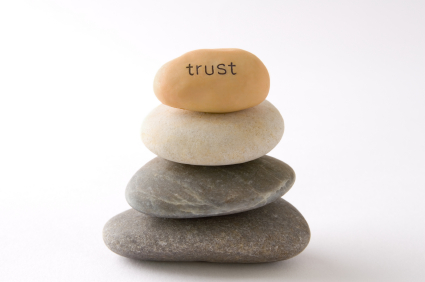Giving and Getting Respect
 Respect is a theme I run across in my work with trust. Many people say they want to be trusted. Yet they feel disrespected by those from whom they seek trust. In such cases, “they don’t trust me” quickly breaks down into “they behave disrespectfully toward me.” A desire morphs into a resentment.
Respect is a theme I run across in my work with trust. Many people say they want to be trusted. Yet they feel disrespected by those from whom they seek trust. In such cases, “they don’t trust me” quickly breaks down into “they behave disrespectfully toward me.” A desire morphs into a resentment.
The unconscious implication is that “if they don’t trust me, it’s their fault, because they don’t respect me in the first place. And if they don’t respect me, then I won’t respect them either. Their lack of trust in me is their fault, not mine.”
There’s a lot going on in that little circle of mis-logic. How is it that we respect others, and that they respect us? What does disrespect have to do with trust?
Note the grammatical parallels between trust and respect. Both are used as verb, as adjective, and as adjectival phrase:
I trust you; I am trustworthy; I am trusted by you
I respect you; I am respectable; I am respected by you
Are there causal links here? And if so, what are they?
There’s an old truism: the fastest way to make a man trustworthy is to trust him. This is one truism that has been proven true to me.
Of course, there is a loose correlation between being trustworthy and being trusted, just as there is between being respectable and being respected.
But – and this is critical – there is no guarantee with either one. Not only can you not always get someone to trust or respect you, but the harder you try – the less likely you are to succeed. This is why trust-based selling is so much more powerful than linear, logic-based selling.
Giving Respect and Trusting
Both trust and respect must be freely given. If demanded or coerced, the results are the opposite–distrust and disrespect. This is why I tell my clients never to call themselves trusted advisors—let your clients make that determination for themselves, and make it public, or not, on their own. Being called a trusted advisor is great marketing, but only if never suborned.
The ability to trust and to respect is a sign of an evolved ability to relate to others. That doesn’t make blind trust or respect a virtue: there is nothing noble about trusting a thief, or respecting a scoundrel. That’s just stupid.
But equally stupid, and more common, is a refusal to trust or to respect others. That refusal is driven by fear and, by way of paranoia, gums up the works of human interactions and commerce.
Being Respected and Being Trusted
Just as trusting others helps but doesn’t guarantee being trusted by them, so does respecting others not guarantee being respected by them. And that’s where we end up feeling “it’s not fair.”
Let’s be clear. When it comes to trust and respect, fairness is not an issue. If your spouse buys you a gift for the holidays, do you think of it as ‘fair’ or not? (Hint: the right answer is ‘no, of course I don’t, Charlie, what do you take me for!’)
Give Respect to Get It? Or Give Respect and Detach?
Too often we try to put conditions on what must be freely given. You can’t reduce trust to a controlled conditional transaction: “If you give me this, I’ll trust you to do that, but you’d better be fair.” There is no trust without risk; if you try to control the outcome, you’ll destroy the trust.
I’m coming to think respect is the same. To respect someone is good; partly because it can make the other person feel respected–but mainly because it shows you’re the kind of person who has an evolved ability to relate to others.
The distinction becomes important when we look for others to respect us. If we crave respect from others, we are setting ourselves up for disappointment. But worst, we are trying to force (via guilt trip) others to do what we want them to
